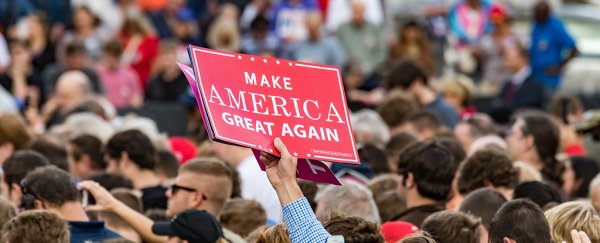Research on political trends over the past two decades has revealed that, while our social media echo chambers might not be helpful, we shouldn't blame them for the polarisation of society's politics.
The idea that digital technology both passively and actively shapes our ideologies has made the web an easy scape-goat for widening social divisions, but it appears those who use social media the least are also those who are gravitating quickest towards the political extremes.
The study, conducted by economists from Stanford and Brown University in the US, made use of data from the American National Election Study (ANES), which has been gathering information on the nation's electoral behaviours since 1948.
Information is collected through face-to-face surveys, and includes such details as voter age, social background, political predispositions, values, and perceptions on political groups and candidates.
Thrown into this mix was a pool of data collected from the Pew Research Centre on internet use during election years dating back to 1996, as well as during a handful of non-election years.
From these numbers the researchers hoped to determine the extent to which political behaviours have changed over the years, and whether there are any clear relationships that might suggest a cause.
While it might seem obvious with the emergence of terms like "alt-right" and "fake news" that our political landscape is bleeding out at its margins, nailing down a definition for polarisation is itself a polarising issue.
The researchers used eight separate measures of political attitude, including partisan sorting based on geography, issue consistency, and straight-ticket voting.
Any which way they cut it, the researchers found the US population has been increasingly polarised in their political views since at least 1996.
However, additional data showed a similar trend dating back even earlier.
"It is interesting to note that the index grew about as quickly in the decade before 1996 as the decade after it, a pattern also exhibited by many of the individual measures," the researchers write in their report.
So what exactly is going on?
We're quick to blame our growing use of the internet, particularly social media platforms such as Facebook and Twitter.
As tribal animals, we humans love nothing more than to weed out and unfriend those who don't share our ideologies, while surrounding ourselves with those who indulge us.
Digital technologies also encourage our confirmation bias by delivering us news and entertainment that's more likely to appeal, based largely on what we've liked before.
But in this particular case, the data doesn't support this model.
"We find that the groups least likely to use the internet experienced larger changes in polarisation between 1996 and 2016 than the groups most likely to use the internet," write the researchers.
For example, by the measure of partisan affect – the attitudes of one political group towards another – polarisation increased three times as fast for those over the age of 65 than it did for those aged 18 to 39.
Similar age-related increases were reflected to various degrees in seven of the eight measures, in fact.
While internet use has gone up overall since data was first gathered in 1996, older generations still don't use the internet as frequently as younger folk.
For last year's US presidential election, more than three-quarters of those aged between 18 and 39 reported to get their information on the campaigns online.
Less than 40 percent of those over 65 turned to the web for their political info, with that figure dipping to less than 20 percent for those older than 75.
"Our findings don't rule out that the internet has played some role in the recent rise in polarisation," says one of the researchers, Jesse Shapiro from Brown University.
"But they cast doubt on some common narratives linking polarisation to online news and social media."
The researchers first released their findings back in March. Their recently published study in the Proceedings of the National Academy of Sciences has expanded on their initial research to include data on the 2016 election.
Social media could have a strong influence, but any model that pins the blame on the internet now has to explain why it affects those who don't get online much at all.
Whatever is pushing our society apart at the edges, it's clearly a complicated topic.
